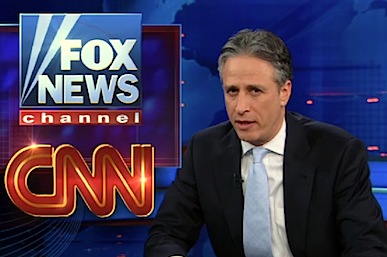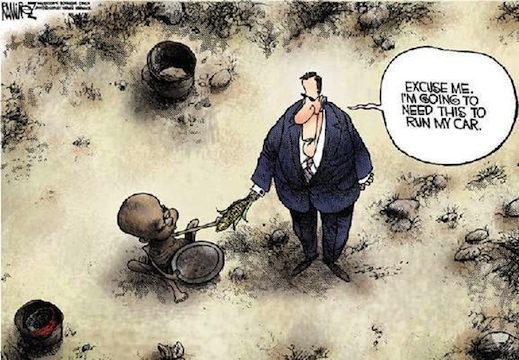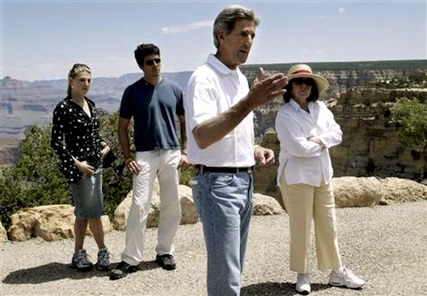5 Reasons You Should Ignore the Presidential Campaign Coverage
Dan Bryan, April 25 2012
 ???
???Political scientists say that $8 billion may be spent on electioneering in this year's Presidential Campaign, but the real tragedy is the untold hours that millions of people will spend reading nonsense fluff pieces about the two main candidates.
Here are 5 reasons you should pay absolutely no attention to the Presidential Campaign coverage this year.
5. The media is incentivized to create stories out of thin air
When you are trying to drive viewers to a particular TV channel or website, the best way to do so is to stir controversy -- particularly in the form of BREAKING NEWS!!
A pernicious form of "breaking news inflation" is the result. Had you even heard of Hilary Rosen before two weeks ago? Congratulations if you had, because I had zero idea that she existed. Suddenly, one off-handed comment became the basis for a media firestorm, with "analysts" analyzing in the effect on women voters this fall.
And what effect will it have? Not much. Or at least, not much compared to decades of evidence on what each party supports when it comes to women's issues.
- Do you still remember when Al Gore changed his wardrobe in 2000 to make himself appear more personable, and "struggled" to establish himself?
- When Bush took a lead in October 2000 because Al Gore "sighed and lied" at the first debate?
- When Teresa Heinz Kerry released part of her 2003 tax returns, which showed she paid a below average rate for that year?
- Or how about the "lipstick on a pig" fracas?
Do you think anybody will look back on these moments as critical turning points in the history of the United States a hundred or even ten years from now?
They might have a had a short term effect in the polls -- but these same polls can bounce by 5 points in a day from random sampling.
Purely for argument's sake, I have selected a random political article that I found today. In it we find:
- An asinine theory on why more whites will vote for Obama in some Midwest states and fewer will vote for him in others, compared to 2008.
- An insight that Obama will have to spend more money in Pennsylvania in 2012 than in 2008.
- An unsupported, hanging assertion at the end that Santorum and Romney did Obama "a small favor" by making him look strong in Pennsylvania. I have no idea how they did this, and the author takes no pains to explain.
4. You already know who you're voting for
This is self-explanatory.
If you voted for Obama in 2008, you're probably going to vote for him again this year. If you voted for McCain, you're probably going to vote for Romney. If you hate the two-party system, kudos.
If you are somehow undecided, and need the kind of political puff pieces that The Daily Beast, Fox News, The Huffington Post, or MSNBC churn out on an hourly basis, then you are not making your voting decisions through the correct prisms. Just read some basic history of what the parties have done and what they stand for. Then take a few minutes to think about what kind of federal government you want.
3. You will be manipulated into thinking Democrats/Republicans are bad people
Pundits, operatives, and talking heads gain when they create caricatures of the other side. It's the manner in which an electorate can be motivated to tromp out to the voting booth, make phone calls, and do all other kinds of things which win elections.
This process explains how one can drive around all day and hear on the radio that Democrats are treasonous, stupid, heathen, venal, condescending creatures who seek nothing more than to impose their tyranny on a virtuous, unwilling populace.
Or how Republicans are corporatist, militaristic, religious fanatics who are only one step from imposing fascism in the United States. They hate women, children, minorities, immigrants, and poor people.
The point is never to present an accurate picture -- but simply to motivate the true believers and spread political propaganda.
Unfortunately, I've personally met a fair share of people who buy into this rhetoric, and who feel awkward around "a Democrat" or "a Republican". I've never found political views to be a very big deal when it comes to hanging out with people, and I fail to understand why someone would want to narrow their life experience in such a fashion.
2. Who wins is of marginal importance to your life
For my entire life, every four years, I hear that the upcoming election is "one of the most important elections in American history."
Every time, this has been absolutely false. Unless you work for a campaign, your life won't change much.
The most important elections were probably the ones in 1800 (The Revolution of 1800), 1828 (Jacksonian Democracy), 1860 (The Civil War), 1876 (The End of Reconstruction), and 1932 (The New Deal). Does anyone look back to 2004 and think, "If only John Kerry would have won, then my life and society would be drastically different today?".
In any case, the powers of the President are limited by an elaborate system of checks and balances that you probably learned about in ninth grade. Do you think Obama has passed watered-down legislation by choice? Do you think he has narrowed his agenda because he's deliberative, moderate person? Or is it because there is absolutely no way he could pass his dream list of legislation in a Republican congress with a conservative Supreme Court in the wings?
I'm not saying Presidential Elections have no effect. Over the long-term, these decisions do add up and you should certainly vote. But most of government and life will keep moving along no matter who wins this fall. Whenever a President steps too far out of the mainstream, their party gets massacred in Congressional elections, and they lose their own reelection bid if they fail to correct themselves.
For example, even if Romney wins the election and Republicans control the House and Senate, it's highly unlikely that they will have the supermajorities required to pass anything but the most moderately conservative legislation.
1. Presidential Election coverage overshadows more important trends
This is the most important reason.
Imagine that you spent all of your time reading political articles and watching Meet the Press instead of doing your own research into long-term issues like:
- The continuing demographic transformation, which will make the United States much more similar to Latin America over the coming decades.
- The graying of America and the coming strain on health care, assisted living, Medicare, Social Security, and government deficits.
- The massive discoveries of natural gas in North Dakota, which should reduce energy costs and cut foreign oil dependence.
- The continuing price declines in real estate which depress construction employment and economic recovery.
- The expansion and potential further expansion of the Federal Reserve's balance sheet, and the increase of oil and commodities prices.
- The negative effect of agribusiness subsidies on the American diet and on third world hunger.

You might overlook how well-hidden, rarely talked about clauses of obscure laws cause foreign children to starve to death.
In conclusion
99% of American political coverage has no long-term value whatsoever.
For now, if you really want to read about an election, focus on the one in France. It will affect your life much more in the next few months, and it portends more for the future of western society.
History has very few absolute lessons, but one that does hold true is this: Always take the long view, and never get caught up in minutiae.

